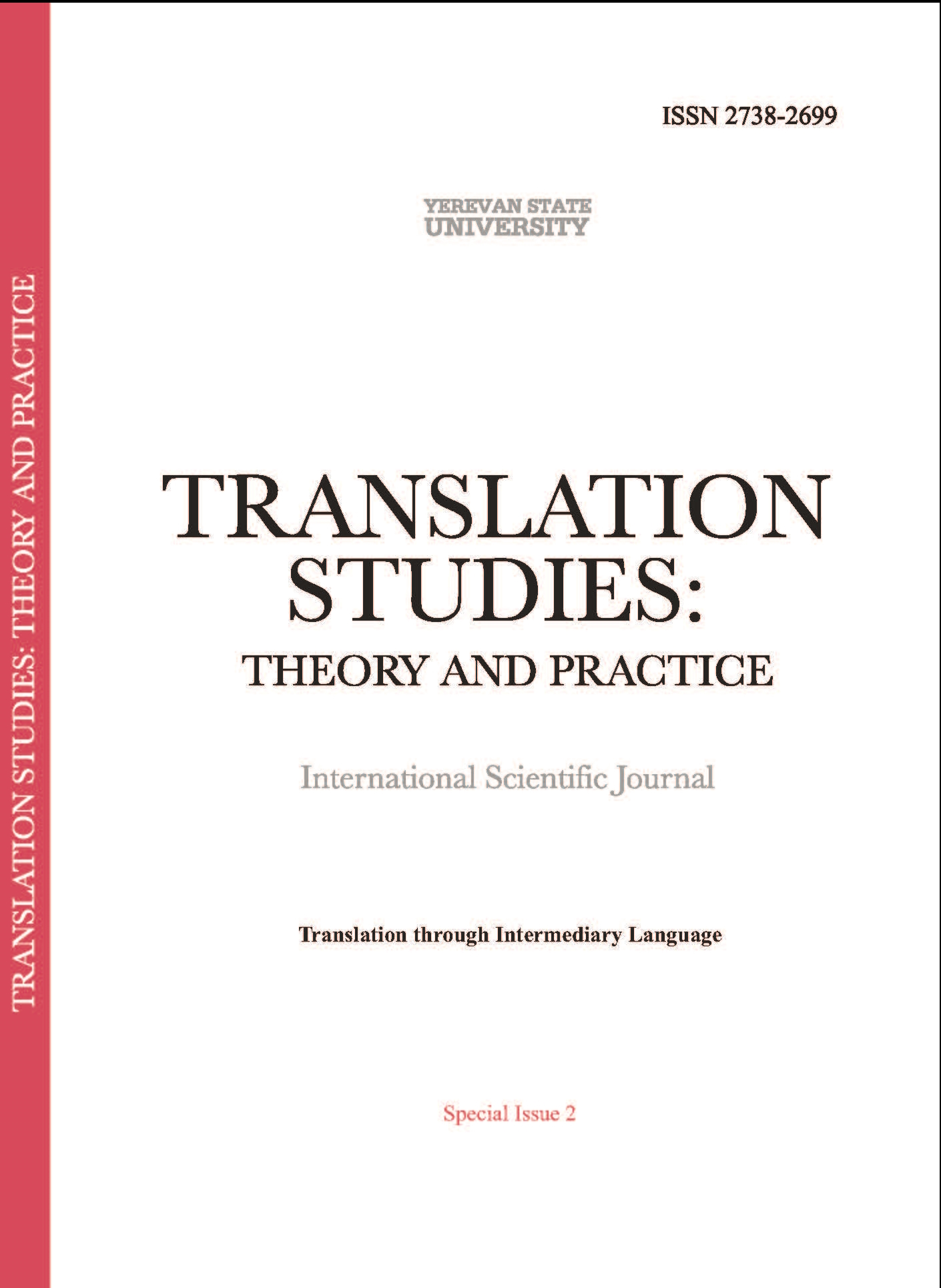The Role of Intermediary Languages in Literary Translations from Russian into Italian: A Brief Historical Survey
DOI:
https://doi.org/10.46991/TSTP/2024.SI.2.111Keywords:
Intermediary Translation, Russian Literature, French language, Italian versionsAbstract
On the background of the historical development of literary translation from Russian into Italian, the present study will focus on some examples of translations made through intermediate languages. In fact, translating from an intermediary language may lead to well-known adverse effects, such as distortion of the contents or deviations from the original text, but it may also provide interesting insights about intercultural dialogue. The purpose of the work is to highlight some of the problematic areas resulting from these types of translation processes, analysing concrete examples of literary products in which the mediation, mainly through French editions, may affect the content and the form of the original text on the syntactic, semantic and stylistic plans. We will also consider to what extent the loss and gain of meaning have taken place because of such shifts. In this respect, it could be argued that in intermediary translation the employment of adaptation strategies is an important element to produce an acceptable and fluent text to the “receptor language” audience.
References
AA.VV., 1979. La traduzione letteraria dal russo nelle lingue romanze e dalle lingue romanze in russo. Milano: Cisalpino-Goliardica, 362-515.
Al Shunnaq, Abdullah. 2019. “Aspects of Translating through Intermediate Languages.” Studies in Translation 5(1):123-150.
Aloe, Stefano. 2000. Angelo De Gubernatis e il mondo slavo: gli esordi della slavistica italiana nei libri, nelle riviste e nell'epistolario di un pioniere, 1865-1913. Pisa: Tipografia Pisana.
Baselica, Giulia. 2011. “Alla scoperta del “genio russo.” Le traduzioni italiane di narrativa russa tra fine Ottocento e primo Novecento.” Tradurre. Pratiche, teorie, strumenti. Spring 2011. Accessed November 10, 2023. https://rivistatradurre.it/2011/04/tradurre-dal-russo-2/
Béghin, Laurent. 2007. Da Gobetti a Ginzburg. Diffusione e ricezione della cultura russa nella Torino del primo dopoguerra. Bruxelles-Rome: Istituto Storico Belga di Roma.
Caratozzolo, Marco. 2023. “La ritraduzione dei classici della letteratura russa. Bilancio (1991-2022) e prospettive.” Studi Slavistici, XX, 1:75-94. DOI: https://10.36253/Studi_Slavis-14009
Cavaion, Danilo. 1994. Letteratura russa dell’Ottocento, in AA.VV., La slavistica in Italia. Cinquant’anni di studi: 1940-1990. Roma: Ministero per i Beni culturali e ambientali, 169-208.
Cifariello, Alessandro. 2023. “Piccolo bilancio delle traduzioni italiane dei classici della narrativa fantascientifica russa (1991-2022).” Studi Slavistici, XX, 1:129-146. DOI: https://doi.org/10.36253/Studi_Slavis-14253
Cronia, Arturo. 1958. La conoscenza del mondo slavo in Italia. Bilancio storico-bibliografico di un millennio. Padova: STEDIV.
Cronin, Michael. 2019. La traduzione nell’era digitale. Italian translation by G. Ballerini and C. Denti, Milano: Morellini Editore. [Orig. ed.: Translation in the Digital Age. London and New York: Routledge, 2013.].
De Michelis, Cesare Giovanni. 1997. “Russia e Italia.” In AA.VV., Storia della civiltà letteraria russa, 2 vol., edited by M. Colucci e R. Picchio. Torino: UTET, 689-709.
Dollerup, Cay. 2000. “Relay and ‘Support’ Translations.” In Translation in Context. Selected Contributions from the EST Congress, edited by Chesterman Andrew, Natividad Gallardo San Salvador, Yves Gambier (Granada 1998). Amsterdam & Philadelphia: John Benjamins, 17-26.
Dollerup, Cay. 2009. Relay and Delay in Translation. Accessed November 10, 2023. http://www.cay-dollerup.dk/publications.asp.
Gallo, Giulia. 1979. “Anna Karenina: storia della prima traduzione italiana.” In AA.VV., La traduzione letteraria dal russo nelle lingue romanze e dalle lingue romanze in russo. Milano: Cisalpino-Goliardica, 26-35.
Ghini, Giuseppe. 2017. “L'eterna influenza francese.” Classici russi per il tramite del francese all'alba del Terzo millennio.” L’Analisi Linguistica e Letteraria, 25(2):159-174. Accessed November 10, 2023. https://www.analisilin¬guisti¬caelett-era¬¬ria.eu/index.php/ojs/article/view/175.
Jovanović, Mladen. 1991. “Deviation and Translation.” Languages and Cultures in Translation Theories, 4(1):83-98. DOI: https://doi.org/10.7202/037083ar
Lo Gatto, Ettore. 1921. Review of M. Gor’kij. “La mia infanzia.” L’Italia che scrive, 12. Italian translation by Kallisia. Milano: Avanti.
Marcucci, Giulia. 2022. Čechov in Italia. La duchessa d’Andria e altre traduzioni (1905-1936). Macerata: Quodlibet.
Mazzucchelli, Sara. 2006. “L’editoria milanese e le traduzioni dal russo.” Europa Orientalis, 25:279-290.
Mazzucchelli, Sara. 2007. “Le traduzioni dal russo nelle recensioni de «L’Italia che scrive» (1919-1939).” La fabbrica del libro. Bollettino di storia dell’editoria in Italia, XIII, 2:25-31.
Messina, Giuseppe L. 1949. “Le traduzioni dal russo nel 1920-1943.” Belfagor, 4(6):693-703.
Offord, Derek; Rjéoutski, Vladislav, and Argent, Gesine. 2018. The French Language in Russia. A Social, Political, Cultural and Literary History. Amsterdam: Amsterdam University Press.
Popovič, Anton. 2006. La scienza della traduzione. Aspetti metodologici. La comunicazione traduttiva. Milano: Hoepli. [Orig. ed. Teória umeleckého prekladu, 1975].
Renton, Bruce. 1960. “La letteratura russa in Italia.” Rassegna sovietica, fasc. VI, 40-59.
Renton, Bruce. 1961. “La letteratura russa in Italia nel XIX secolo.” Rassegna sovietica, fasc. I, 48-80, fasc. III, 27-69, fasc. IV, 36-70 e fasc. V, 67-94.
Salmon, Laura. 2017. Teoria della traduzione. Milano: Franco Angeli.
Scandura, Claudia. 2002. La letteratura russa in Italia: un secolo di traduzioni. Roma. Bulzoni.
Sorina, Marina. 2009. La Russia nello specchio dell’editoria italiana nel ventennio fascista: bibliografia, scelte e strategie. Tesi di Dottorato di Ricerca in Letterature e Scienze della Letteratura, XX ciclo, Università di Verona.
Stroilova, Alevtina G., and Dmitriev, Nikolaj M. 2016. “Intermediary Translation in Russian and English Literary Relations: Analysis of “Night Thoughts” by E. Young in Russian Translations.” Procedia - Social and Behavioral Sciences 236:131-138.
Torop, Peter. 2010. La traduzione totale. Tipi di processo traduttivo nella cultura. Milano: Hoepli. [Orig. ed. Total’nyj perevod, izd. Tartuskogo Universiteta, Tartu 1995].
Washbourne, Kelly. 2013. “Nonlinear Narratives: Paths of Indirect and Relay Translation.” Meta. Journal des traducteurs, 58(3):479-672. DOI: https://doi.org/10.7202/1025054ar
Yegorov, Oleg. 2017. “Why Was French Spoken in Russia?.” Russia Beyond. Accessed November 10, 2023. https://www.rbth.com/¬politics_and_society/-2017/05/25/why-was-french-spoken-in-russia_770185
Zaborov, Petr Romanovich. 2008. “Perevodi-posredniki v istorii russkoy literaturi” [Intermediate Translators in the History of Russian Literature]. In Russko-evropeiskie literaturnye sviazi. XVIII vek. [Russian-European Literary Relations. 18th Century], edited by P.E. Bukharkin. Saint Petersburg: Faculty of Philology and Arts of Saint Petersburg State University Publishers, 307–315.
Downloads
Published
How to Cite
Issue
Section
License
Copyright (c) 2024 Ilaria Remonato

This work is licensed under a Creative Commons Attribution-NonCommercial 4.0 International License.










